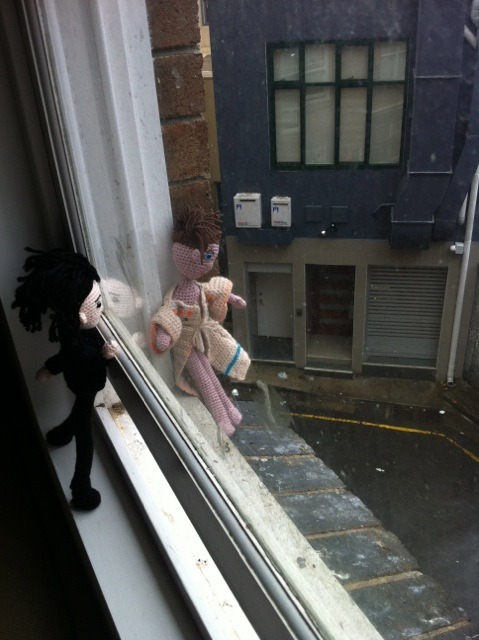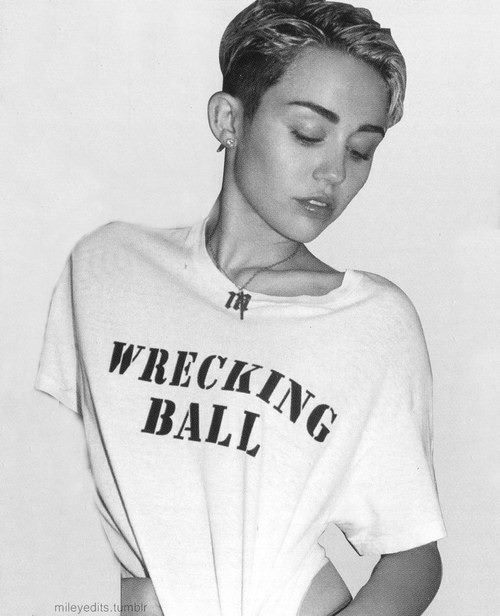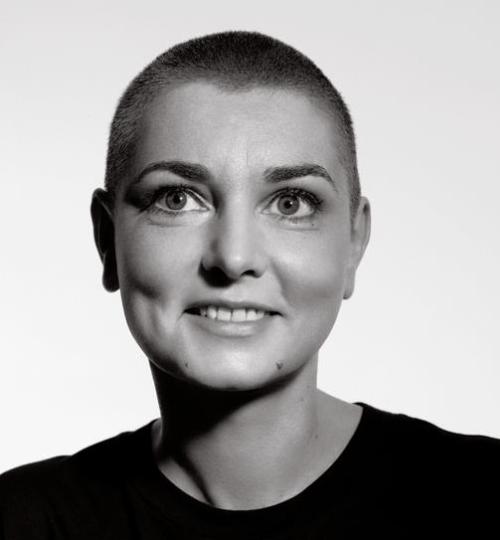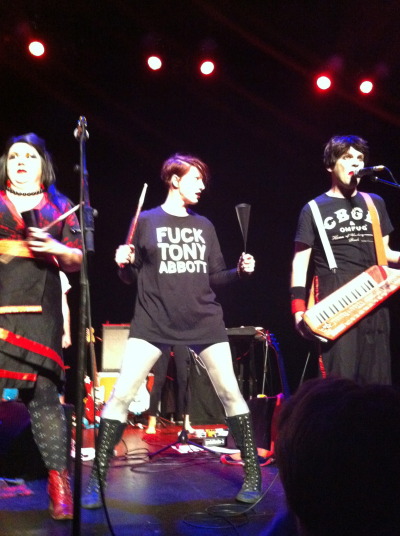I’m coming to terms, little by little, that a blogger (bloggist? bloggerator? bloggoid? blogsbody?) is not what I am by nature.
It’s my nature to write long, rambling posts on matters that are, for the overwhelmingly larger part, of interest only to me. I’m not that way out of selfishness, it’s just how it turns out.
And so, most of the time, I don’t do it. I play a guilt-game with myself about it, upset that I can’t think of anything to write that people might find worth reading, wishing to write about some topic that I’ve made into my latest obsession (oh yes, I’m one of those types, the sort that have a hundred half-finished projects lying around the house). I tell myself that it’s not worth putting words on the screen, that people will be angry, that people will be bored. Feedback from my stories and poems has been surprisingly good; feedback on my blog posts is almost non-existent.
But you know what?
Fuck that.
I don’t use that term lightly, and not just because my mother sometimes reads this stuff (though, I’ll be honest, that is one of the reasons). I’m using it now for a couple of reasons: firstly, because there’s a certain level of conviction that is most easily portrayed with profanity; and secondly because of Amanda Palmer.

Amanda Palmer performing in Auckland, 2006
I’ll explain.
For those of you who aren’t aware, Amanda Palmer is a singer, songwriter, performer, activist, feminist, visionary, ex human statue and downright inspirational person. I became aware of her existence through the wonderfully quirky, charming and heartbreaking song, Coin-Operated Boy, performed during her days as half of the ‘Brechtian punk cabaret’ duo, the Dresden Dolls. Her quirky style, open heart, sense of humour and incredible drummer (Brian Viglione, yeah, the same one from the Violent Femmes) caught my attention immediately. The robust song about heartbreak, loss and disappointment tugged at my art-strings.
[youtube=http://www.youtube.com/watch?v=j4gPZPKJc0s]
I should point out that I don’t listen to a lot of music. I catch the songs that drift by me and consume them avidly but I don’t go out of my way to hunt them down. I’m a music scavenger, not a music predator. So when I find something that really makes me sit up and go ‘Wow,’ I don’t take it lightly.
I don’t own any of Ms Palmer’s albums. I catch what I can in passing and, in a strange way that may not make sense, I feel them to be all the more special for that. They drift in and out of my life, challenging me at particular times, like bra-clad leaves wielding ukeleles.
I follow Ms Palmer’s Tumblr account and find her words, her courage, her strength to be inspiring. She was given a crochet doll of herself recently, along with one of her husband Neil Gaiman, and in her typically rich sense of humour she almost immediately began posting photos of them in interesting positions – talking, sitting with their heads in each others’ laps, arguing, sleeping, making love (despite the Neil Gaiman doll’s clothes not being removable), and so on.
And then, scrolling down…
There’s one of them in which the Amanda doll is sitting on a window ledge. The window is closed. The Neil doll is on the inside, looking out, and the caption reads: NO AMANDA DON’T DO IT! YOU HAVE SO MUCH TO LIVE FOR.

NO AMANDA DON’T DO IT! YOU HAVE SO MUCH TO LIVE FOR.
It’s heartbreaking, it’s real, it’s challenging and it’s intimate. And that, ladies and gentlemen, is Amanda Palmer. She will make you gasp and cheer, cry and curse, process and reassess. She will stand before you in a kimono or a bra, a ‘FUCK TONY ABBOTT’ t-shirt or an ornate dress – or she will stand before you naked, clad only in music and sincerity.
But she will always – always – be Amanda Palmer.
She is bold and raw before you, she who stands proud in her armour of Self.
This blog post does have a point, though, and I’m getting to it. I did say I ramble.
You’ll possibly have heard of the (extremely) recent clashes betwixt Irish-born singer Sinead O’Connor and the increasingly infamous Miley Cyrus. If you haven’t, the summary is this as follows.
Miley Cyrus is the daughter of Billy Ray Cyrus (the Achy Breaky Heart guy) and you may well know her as Hannah Montana. Well, Miley has grown up and is now performing her own work the way she wants to perform it, something that’s got a lot of people somewhat perturbed. Relatively recently she started displaying a tendency to stick her tongue out a lot and she’s experimenting with nudity in her film clips. Most notably, though, was her performance at the MTV Awards. It involved twerking, teddy bears, foam fingers and the aptly-named Robin Thicke – the point is a lot of people found it tasteless (at best).
I, for the record, think that if people are going to shake their heads in shock at a young woman sticking her tongue out and implying she has a sexuality and completely ignore the white dude behind her perpetuating rape culture with a horrid little song about ignoring consent (it’s called Blurred Lines, if you’re wondering; look it up on YouTube because I’m not going to contaminate my blog with its nonsense) then there’s something seriously wrong with society.

Miley Cyrus
Was the performance tasteful? Probably not. Some people are stating the performance was racist because there were black people in it dressed up as animals – and yes, I can see how that could be an issue, though I doubt it was anyone’s intention to be racist (from what I could see almost the entirety of the cast was black, Ms Cyrus and Idiot Thicke being the only notable exceptions). Looking at a few of her other clips it seems pretty clear Ms Cyrus is attempting to portray herself as being, if you like, a bit of a ‘wigga’ (a term I don’t personally like at all). She’s In With The Rap Crowd and yes, that area of music is dominated by African-Americans (and no, I don’t think that’s necessarily a problem). She’s not the first white woman to do so and she won’t be the last, not by a long shot.
But the majority of the classist, misogynistic backlash from it seems based mostly around the Western world’s horror that a young woman attempting to break out of a childhood role and into her own art-space has had the audacity to proclaim her sexual energy and use shock tactics to get people’s attention. Something that white male American radio shock-jockeys do verbally every day is somehow devastatingly horrid coming from Ms Cyrus. Doesn’t that seem a little stilted?
She’s a young woman attempting to reinvent herself from a past in which she’s been shaped purposefully into, well, Hannah Montana. If she seems like she’s going too far in breaking out of that role maybe, just maybe, she has a point. So while her work isn’t to my tastes I can still see what she’s doing with her art and guess at why.

Sinead O’Connor
One of the people dismayed at her recent work, as mentioned before, is Ms O’Connor. She penned an open letter to Ms Cyrus and that opened up a hell of a mess.
Whether Ms O’Connor’s letter was valid or not (and I believe it was both valid and missed several points) there’s no denying that Ms Cyrus’s reaction was out of taste and extreme. She immediately began to mock Ms O’Connor over Twitter (and Amanda Bynes, for some reason), implying mental instability and so forth. Ms O’Connor’s reaction to this was not as graceful nor as peaceful as her opening letter was, undoubtedly, intended to be.
Let me repeat that, in order to be clear: Sinead O’Connor started this. Ms Cyrus may have brought the media to Ms O’Connor’s door by citing her as an inspiration but it was Ms O’Connor herself that started the (open) correspondence between them. She did so with, I don’t doubt, the best of intentions. She also implied that Miley Cyrus is being manipulated into behaving ‘like a prostitute’ and either completely missed or intentionally ignored the possibility that the image Ms Cyrus is portraying might be absolutely intentional on her behalf (does that make her choices good? No, not necessarily, but it does make them hers). Ms Cyrus reacted like a petulant teenager who’s been slapped on the wrist (sorry, but it’s true, her Twitter escapades were out of line, she could have handled the matter much more maturely and she chose not to). Things escalated. Offensive slights about mental illness were made (by Ms Cyrus). Insulting comparisons were made (by both parties). Legal threats were made (by Ms O’Connor).
I don’t want people to misinterpret my opinion on this (not that my opinion is particularly important, but it is mine): I’m not condoning Ms Cyrus’s actions in responding to Ms O’Connor’s well-intentioned letter. Making fun of people with mental illnesses is never, ever okay (and being a person with a neurological disorder and a mental illness I am particularly sensitive to such matters). It was heartless, cruel and low. There’s a lot of backlash about that – some people are calling Ms Cyrus extremely unpleasant names over this – and I feel that she’s simply going to have to wear that. She should definitely offer a full and public apology. The world doesn’t need a second Justin Bieber. I also feel that whether it was well-intentioned or not Ms O’Connor’s initial open letter was, in fact, somewhat patronising. Again, I applaud her sense of concern, but I doubt Ms O’Connor’s belief that Ms Cyrus is being pushed into anything she doesn’t want to be. She strikes me as the sort of woman who’d more than happily push right back. So yes, I think she was patronising Ms Cyrus. I think her heart was in the right place but her perceptions of the situation were (and probably continue to be) somewhat off.
In fact, the whole thing strikes me very much as a protective mother and a rebellious daughter.

Amanda Palmer, Melbourne, 2013
Amanda Palmer, meanwhile, crafted a letter to Ms O’Connor. You can read it on her website here.
This is something I want everyone who reads this long-winded blog post to understand. There’s a reason why I freaking adore Ms Palmer so much, a reason why she’s just as much an inspiration to me as her husband (though in a different way) and there’s a damn good reason why we need more people in the world like her.
There’s also a damn good reason why this blog post isn’t actually about Ms Cyrus or Ms O’Connor. It’s about Ms Palmer. The mess that’s unfolded over the last couple of days has simply pushed to the fore why, especially at times like these, we need more people like Amanda Palmer in the world.
At the core of everything, under the music and the make-up, the kimono and the bra, even under the flesh and the bones, Ms Palmer wants something very simple.
She wants people to be allowed and to be encouraged to be proud of themselves.
There are no words to describe how much that means to me, how precious it is. She’s a golden heart wrapped in skin. She’s made mistakes, she’s fought tooth and nail through a male-dominated industry, she’s battled record labels for her right to be herself, she’s battled depression (and no doubt still does; depression is a clingy bastard that won’t stop calling and leaving creepy messages). She could be incredibly jaded, bitter, immutably and incurably cynical about the world – but she’s not. She has hope, dreams and laughter aplenty for the world to enjoy. While Ms O’Connor and Ms Cyrus were taking pot-shots at one another she was enjoying the company of young girls interested in music, looking and knowing the future was unfolding right before her eyes – and that the future is full of hope.
If she can look at the world with such wonder why can’t we all?
I am, as you’ve no doubt gathered, not female. Nor am I a singer. I barely even really consider myself an artist; I’m more some dude with a keyboard, a blog and a head full of doubts. Ms Palmer doesn’t know me; very likely she never will. Like most of my inspirations she’s a distant figure that my admiring mind irrationally thinks can accomplish miracles, a person who seems so alien and familiar to me at once, and who wouldn’t know me from anyone else should she see me on the street. But that’s all right. She’s in the world and that’s a valuable, important thing.
Back to the point, despite not being a female singer artist her open letter struck a deep chord within me. This is an important lesson for anyone interested in any kind of self-expression. Y’all should read Ms Palmer’s letter for the simple, elegant concept of an artist’s uniform.
It’s not just about clothes, of course, it’s about style, direction, intent, drive, passion. Like many writers I spend a lot more time worrying whether my works will seem too similar to one or another of my muses. I worry about whether my work is original enough and yet familiar enough. Different enough but not too different. I concern myself over which genre to work in (or whether to work in several), whether my style suits one more than another, which demographic to aim for so that I’m not just swinging wildly in the dark hoping to make some kind of connection.
And you know what? It’s okay for writers to try on their own uniform, to change it now and then, to experiment and to play. It’s okay for us to give ourselves permission to do that. It’s okay for fine artists to go through a dozen mediums until they find the one that works (sculpting with plasticine? Awesome! Oil painting with your fingers? Great!). We don’t need to commit our lives to just one thing and we’re not failures if we find, halfway through something, that it really isn’t Us. We are permitted to learn about ourselves. We’re allowed to allow ourselves that and if it makes us better as artists, better as people, then there’s no shame in going, ‘Well, raffia didn’t work, guess I’ll give all this stuff away to the local school’s art department.’ It’s okay if my poems mimic English nursery rhymes, my stories are trite and my blog posts are boring. And it’s okay if they’re none of those things.
That’s my TIL. That’s the lesson I took from this fracas about women proclaiming each other to be acting like prostitutes, or to be crazy, or this or that. One woman, in the middle of it, seeing both sides and calling for mutual support rather than mutual criticism. One woman saying, ‘It’s okay to learn who you are.’
I feel deeply humbled and immensely privileged to be a part of a world in which the ballad that is Amanda Palmer continues to unfold.
— Scott Thornby, 4th of October, 2013
A short note about titles…
You’ll note throughout this blog post, and perhaps others that I’ve written, that I tend toward the formal ‘Ms’ more often than I use people’s first names. This is meant as a mark of respect. It’s a legacy of how I was brought up; I don’t tend to use people’s first names unless I’ve been introduced to them with only a first name, I know them reasonably well or they’ve explicitly given me permission to use their first name (or a nickname). My apologies if it seems archaic or awkward.
As an aside you’ll notice I don’t afford Robin Thicke the same courtesy. Yes, you can guess why.





 The month has come and gone with surprising speed. To be fair, though, that’s the nature of time.
The month has come and gone with surprising speed. To be fair, though, that’s the nature of time.



